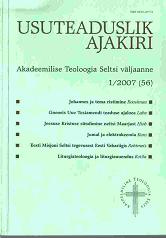Miks teadus vajab teoloogiat?
Why Science Needs Theology?
Author(s): Nancey MurphySubject(s): Christian Theology and Religion
Published by: Akadeemiline Teoloogia Selts
Keywords: Science and Religion
Summary/Abstract: This article has set out to address the question of why the sciences need theology. It focuses especially on why the human sciences need theology. Two resources are used. One is Arthur Peacocke’s model for relating theology to the sciences – a hierarchy of sciences studying increasing levels of complexity in nature – with theology at the top, because it studies the most complex level possible, that of the relation of God to all of reality. Alasdair MacIntyre’s arguments are also employed regarding the nature of ethics. He claims that without some concept of ultimate reality we will never be able to settle disagreements about the ultimate purpose of human life. And without an account of the human telos, in turn, we will never be able to settle disagreements about particular moral issues. These two resources are put together in the following way: the author claims that the human sciences raise boundary questions – that is, questions that can be formulated at the level of that science, but cannot be answered without taking into account a higher level of analysis. The most daunting questions raised by the human sciences are ethical questions, and this returns us to MacIntyre’s claim that ethical questions call for theological answers. Finally, all of the human sciences are, in a sense, theology-laden. That is, all accounts of what is normal or good or desirable for humans, individually or socially, are presupposing some account of ultimate reality. If it is not a theistic account, then implicitly or explicitly, it is the universe itself that is taken to be ultimate, and conclusions such as that of physicist Steven Weinberg follow: the more we understand about the universe, the more it seems pointless.
Journal: Usuteaduslik Ajakiri
- Issue Year: 2008
- Issue No: 1 (57)
- Page Range: 119-135
- Page Count: 17
- Language: Estonian

